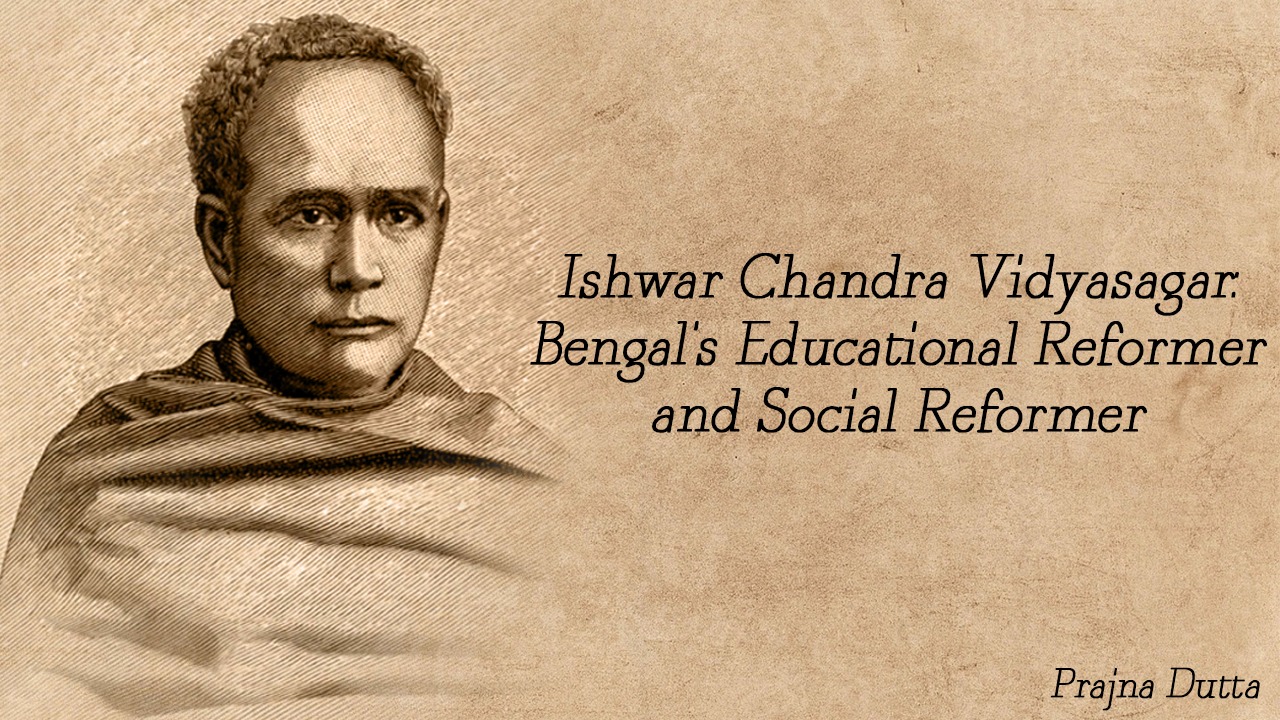Introduction:
Bengal has been blessed with numerous luminaries who have made significant contributions to the fields of education, literature, and social reform. Among these exceptional individuals, Ishwar Chandra Vidyasagar stands out as a towering figure, revered for his tireless efforts in transforming the educational landscape of Bengal and advocating for social change. Born on September 26, 1820, Vidyasagar's legacy continues to shape the intellectual and cultural fabric of Bengal even today. In this blog, we will explore the remarkable contributions of Ishwar Chandra Vidyasagar and his enduring impact on Bengal.
Early Life and Education:
Ishwar Chandra Vidyasagar was born in a humble Brahmin family in the village of Birsingha, West Bengal. Despite financial constraints, he received an excellent education in Sanskrit and Bengali literature. Vidyasagar's insatiable thirst for knowledge, coupled with his exceptional intellect, propelled him to become one of the most erudite scholars of his time.
Transformation of Education System:
One of Vidyasagar's most significant contributions was his pivotal role in revolutionizing the education system in Bengal. He staunchly believed in the power of education as a means of social upliftment and empowerment. Vidyasagar understood that education should be accessible to all, regardless of caste, gender, or social status.
As the principal of Sanskrit College in Calcutta (now Kolkata), Vidyasagar introduced novel reforms that aimed to make education more inclusive and progressive. He advocated for the use of the vernacular language, Bengali, as the medium of instruction, instead of Sanskrit, which was inaccessible to many. This reform helped to democratize education and made it accessible to a broader section of society.
Vidyasagar also played a crucial role in promoting the education of women. He established multiple schools for girls, challenging the prevailing orthodox norms that restricted women's education. His efforts were instrumental in empowering countless Bengali women and fostering their intellectual and social development.
Social Reforms and Women's Rights:
Apart from his contributions to education, Vidyasagar was a passionate social reformer. He fought against various social evils prevalent during his time, such as child marriage, widow remarriage, and the caste system. He actively campaigned for legal reforms to raise the minimum age for marriage, seeking to protect the rights of young girls who were often forced into early marriages.
His most significant contribution to social reform was his relentless advocacy for widow remarriage. Vidyasagar's efforts culminated in the successful passage of the Widow Remarriage Act in 1856. This groundbreaking legislation allowed widows to remarry, challenging the deeply rooted societal taboos surrounding widowhood and empowering countless women who were trapped in oppressive circumstances.
Legacy and Impact:
Ishwar Chandra Vidyasagar's legacy is enduring and far-reaching. His contributions to education and social reform have left an indelible mark on Bengal's cultural and intellectual landscape. His vision of inclusive education and gender equality paved the way for subsequent generations of social reformers and educationalists, inspiring them to continue his noble work.
Vidyasagar's efforts in promoting women's rights and empowering marginalized communities have had a profound impact on the social fabric of Bengal. His reforms shattered archaic social barriers and fostered a more egalitarian society.
Continuation:
Vidyasagar's tireless dedication to education and social reform continues to inspire generations. His emphasis on the importance of education as a tool for empowerment and social progress resonates even today. The educational institutions he established, such as the Bethune School and the Metropolitan Institution, still stand as symbols of his commitment to providing quality education to all.
Furthermore, Vidyasagar's advocacy for women's rights and widow remarriage challenged deep-rooted patriarchal norms and contributed to the liberation of women from oppressive practices. His relentless efforts in this regard influenced the trajectory of women's rights movements in Bengal and laid the foundation for the pursuit of gender equality.
Vidyasagar's contributions to Bengali literature are equally noteworthy. He was a prolific writer and translator, and his works continue to be celebrated for their literary merit and social relevance. His most famous work, "Barna Parichay," a primer for learning Bengali script, remains an essential text for language learners even today.
Moreover, Vidyasagar's commitment to social justice and his unwavering belief in the power of education have inspired countless individuals to follow in his footsteps. His teachings and principles continue to guide educationalists, social workers, and activists, reminding them of the transformative potential of their work.
In recognition of his immense contributions to society, Ishwar Chandra Vidyasagar was widely revered as "Vidyasagar," meaning "Ocean of Knowledge." His impact extends far beyond Bengal, as his ideas and philosophy have influenced social reform movements across the country.
Conclusion:
Ishwar Chandra Vidyasagar's contributions to Bengal are unparalleled. His unwavering commitment to education, social reform, and women's rights has left an indelible mark on the cultural, intellectual, and social landscape of Bengal. His progressive vision and tireless efforts continue to inspire generations to strive for a more inclusive and equitable society.
As we celebrate the legacy of Ishwar Chandra Vidyasagar, let us honor his memory by upholding the values he championed: access to education, gender equality, and social justice. By doing so, we can ensure that his contributions continue to shape Bengal's future, fostering a society where knowledge, equality, and compassion flourish.

qpDkideyVOI
qpDkideyVOI